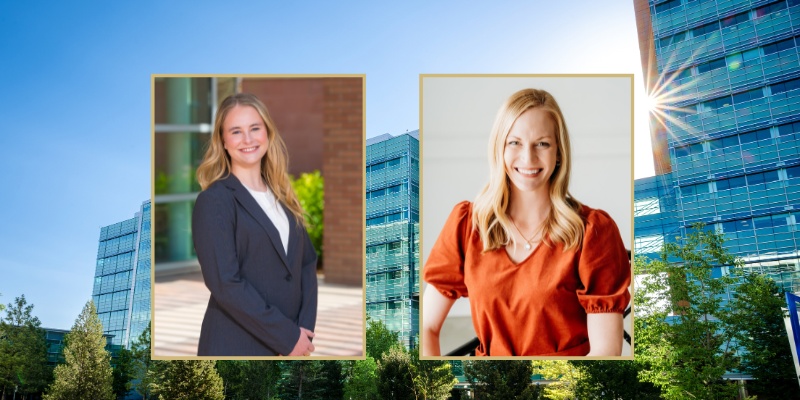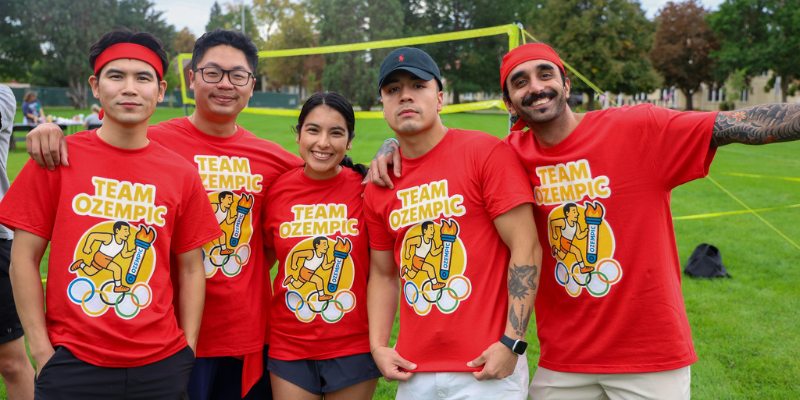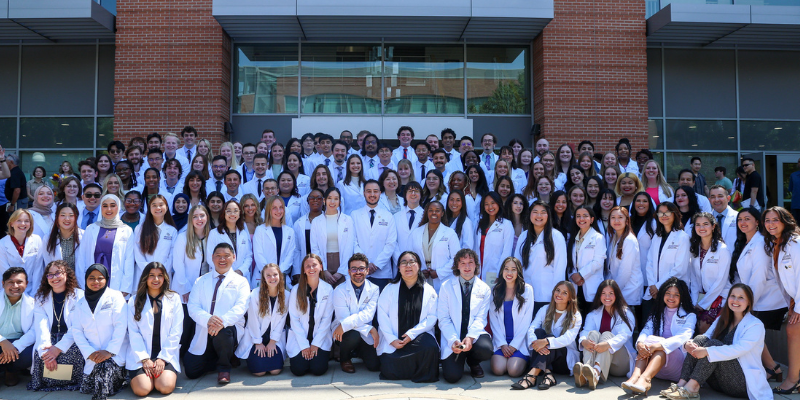Last fall, P4 Tamanna Talwar was selected as one of the first student-faculty pairs in the American Association of Colleges of Pharmacy (AACP)’s Aspiring Academics Program. New in 2023, the Aspiring Academics Program is “designed to inform and inspire students from diverse backgrounds who are interested in pursuing an academic pharmacy career.” The program accepted only twenty student-faculty pairs from a nationwide pool of applicants. Here, Talwar guest writes a post about her experience at the AACP conference, celebrating her completion of the program.

Tamanna Talwar at the AACP Conference with her poster presentation. |
Attending the AACP conference for the first time as a student pharmacist, I was ecstatic to celebrate the accomplishments my peers and I had achieved throughout the inaugural Aspiring Academics Program. The program divided us into groups of five, allowing us to work with outside mentors to expand our networking opportunities and connections with other student pharmacists. After a year's worth of collaboration over Zoom, the cohort was finally connecting in person. However, I was also curious about the day-to-day events of the conference and how they would tie back to the educational modules we had completed during the first half of the program. Reflecting on the conference, I gained a new perspective on enriched learning and its application within the pharmacy curriculum.
The first day featured a teacher’s seminar, which focused on a variety of topics applicable to both didactic and experiential settings. Key themes included critical thinking and reasoning, strategies to improve learners' thought processes, and the implementation of metacognition. As a student pharmacist, it was fascinating to gain insight into the process of learning and the considerable thought that goes into engaging students effectively. Discussions centered around modeling, reflection, and scaffolding, which are primary strategies that can be utilized in a learner’s environment. This seminar tied back to the second module taught in the Aspiring Academics program, which focused on different teaching strategies commonly used to assess teaching effectiveness. Strategies such as peer observation are frequently employed by faculty mentors to provide constructive feedback on teaching methods. Additionally, assessing students' performance allows junior and assistant professors to gauge in real-time the trends and patterns in students’ grasp of educational material. The discussions on the first day allowed me to build upon the baseline information I had learned and to continue thinking about effective strategies that emphasize the thinking process rather than just the outcome.




On the second day of the conference, the first half was dedicated to attending talks, while the latter half focused on the poster presentation and the Aspiring Academics reception night. The topics covered a variety of interests, from experiential learning to the uncertain future of AI integration into pharmacy education. As a prospective student interested in pursuing academia, it was an invaluable opportunity to learn how to continually implement quality strategies to improve student performance and create actionable change. One of the sessions I attended focused on APPE readiness, which was particularly relevant to me as a current fourth-year student. I was able to actively reflect on the key components discussed, such as baseline knowledge of material and standardized assessment practices like NAPLEX review. This self-reflection allowed me to brainstorm a plan of next steps to ensure that I am properly prepared for residency applications and beyond.
Another topic of interest was the integration of social determinants of health (SDOH) in pharmacy programs. Different programs discussed various ways they have incorporated these critical components into their curriculum, ranging from engaging with SDOH in daily didactic material, to elective courses focusing on the context of SDOH in specialty care for application within experiential settings. Successful integration, as discussed among different pharmacy programs, provided great insight into how the profession of pharmacy actively works to address gaps within SDOH. This personally tied back, as my initial interest in the pharmacy profession was sparked by working in the DAWN clinic, a student-run clinic that focuses on giving back to the Aurora community.
Attending the talk on social determinants of health was a full-circle moment, and something I hope to contribute to the future.
Following the talks, the poster presentation session took place. The Aspiring Academics Program asked the five groups to create poster presentations on topics related to academia. My group worked on a longitudinal project focused on student wellness, conducting a digital scan of wellness initiatives within colleges of pharmacy. We divided our list into four different regions of the U.S., then split the schools evenly among private and public colleges of pharmacy and conducted a digital scan regarding topics of wellness. Surprisingly, based on the 40 schools we scanned, only 22.5% published online information regarding wellness events. While the full scope of wellness initiatives may not be adequately represented on the websites, it is an important resource that could be better utilized for prospective and current students. The AACP has adopted policies regarding their commitment to well-being in pharmacy education, and this represents an opportunity to further explore ways to implement events, talks, and other resources focused on well-being to ensure that student pharmacists are supported.
Overall, the conference allowed me to delve into the importance of learning and how current professors continually work to equip learners with strategies for effectively utilizing critical thinking skills. It was an eye-opening experience, revealing how dedicated our professors are not only to teaching the material but also to implementing practices and strategies that foster a more comprehensive thinking environment. Moreover, the collaborative engagement among all the pharmacy programs and pharmacists was delightful to witness. I had the opportunity to network with a variety of pharmacists, each sharing their unique journey into academia, which was both encouraging and inspiring. This conference was a cherished opportunity for reflection, and I am eager to apply the strategies I learned to my future practice.




